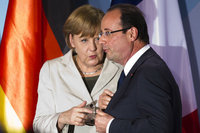France and Germany to lock up their borders
Western European countries are preparing the ground for the revision of the Schengen border control and recovery. France and Germany are primarily interested in taking such measures aimed at ensuring the EU's internal borders. The new French president Francois Hollande, as well as his predecessor, Nicolas Sarkozy, is in favor of strengthening the fight against illegal migration. Enhancement of border controls, especially in the south of France, can significantly reduce the flow of migrants, the Ministry of Internal Affairs believes.
The German government also supports the retention of the right to restore borders in the EU. German Interior Minister Hans-Peter Friedrich repeatedly spoke in favor of the partial revision of the Schengen Agreement. Without denying the importance of maintaining the Schengen area, Frederick, however, insists that the internal security of each country is a priority.

The German politician expressed particular concern over the problems of uncontrolled illegal immigration, which "is a direct threat to the stability and security of the entire Old World," information portal Newsru.com quoted Hans-Peter Friedrich.
The debate around the issue of open borders has been ongoing for years. When Europe has supported democratic change in the Middle East and Africa, no one imagined that soon the "Arab spring" could ripple to the European continent. Refugees from Tunisia, Egypt and Libya flooded into Greece and Italy. Thanks to the Schengen area hundreds of migrants could later move to France, Austria and Germany.
Nicolas Sarkozy was one of the first to express his discontent by the transparency of the European borders. Then France unequivocally declared that it refused to respect the Schengen agreements if control over the external borders of the EU is not enhanced. In 2011, the French managed to get permission from the European Committee for inspection of trains from Italy to stop the flow of illegals.
European officials did not hide their frustration with the fact that the majority of African migrants penetrated the continent via Greece unable to control the border with Turkey. The Greeks, who were considered the main culprits of the crisis in the euro area, again had to make excuses and hurriedly strengthen measures against mass migration. In March of 2012 Europe once again was talking about the introduction of internal border controls.
Finally, on June 7 at the Council of Ministers meeting in Luxembourg, a decision was made that may influence the further development of the entire European Union. Henceforth, the government of the united Europe has the right to temporary reintroduce border controls for six months. Special approvals are no longer required. To restore the border it will be sufficient to inform the neighboring states of the decision. In addition, in emergency situation border closure is now permitted for two years, which would constitute a serious precedent for the entire European Union.
However, some countries in the united Europe have resorted to exceptional measures in matters relating to border security. The special position of the Schengen Agreement, which allows in exceptional cases up to 30 days to recover control of the borders was used several times: in 1995 after the terrorist attacks in Paris, in 2001 during a summit of the "G8" in Genoa where there were major clashes between the authorities and anti-globalists, and in 2009 during a NATO summit in the French city of Strasbourg, the French International Radio (RFI) reported referring to Figaro newspaper.
However, the current decision in Luxembourg led to an extremely negative reaction of the European Committee. These amendments to the Schengen agreement could undermine the foundations of the EU in its entirety, Brussels believes. Recently, European Commissioner for Internal Affairs Cecilia Malmström said that the move "undermines the achievements of the European integration." "I am deeply disappointed by the lack of European ambitions of the participants of the meeting," quoted Malmström Newsru.com.
It is not clear how far the Europeans are ready to go to tighten the measures against mass migration from Africa and the Middle East. However, initial steps have already been taken.
Another question is how the new strategy in Germany, France and Italy will reflect on the state of affairs in the European Union that is going through hard times. Today, diplomats, analysts and chief executives are talking about the failure of multiculturalism policy increasingly more. However, the debate about the degree of openness of European borders is not finished yet. In this regard it is worth noting that the present decision of the heads of the EU Interior Ministry announced on June 7 could not be considered definitive. Now, the amendment to the Schengen Agreement that has already caused a backlash of MPs must be approved in the EU institutions.
Yuri Sosinsky-Semikhat
Pravda.Ru
Subscribe to Pravda.Ru Telegram channel, Facebook, RSS!


